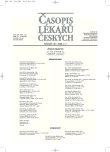Autosomal Recessive Ethnical Diseases of Czech Roma
Autozomálně recesivní etnické choroby českých Romů
Romové tvoří geneticky izolovanou etnickou skupinu stejného původu s odhadovaným celosvětovým počtem 10–14 milionů osob, vzešlou z omezeného počtu tzv. zakladatelů. Většina (asi 8 milionů) příslušníků romského etnika žije v Evropě, zejména na Balkáně a jihovýchodě Evropy. U Romů se vyskytují specifické dědičné choroby, způsobené stejnou recesivní genetickou poruchou. V posledních letech byl molekulárně geneticky objasněn a potvrzen podklad některých chorob v romské populaci. Vzhledem k významnému podílu romského etnika v naší populaci je možné se s romskými pacienty postiženými těmito chorobami setkat i v České republice. Diagnostika těchto chorob však dělá nezřídka problémy a tyto choroby proto bývají poddiagnostikovány či nesprávně diagnostikovány. Uvádíme příklady autozomálně recesivních chorob potvrditelných i na DNA úrovni, vyskytujících se u Romů v České republice: syndrom kongenitální katarakty, faciální dysmorfismus a demyelinizační neuropatie, nesyndromové prelingvální hluchota s poruchou GJB2 genu a kongenitální myastenický syndrom.
Klíčová slova:
syndrom kongenitální katarakty, facialního dysmorfismu a demyelinizační neuropatie; kongenitální myastenický syndrom, nesyndromová prelingvální hluchota v důsledku poruchy GJB2 genu, founder, Romové, gypsy.
Authors:
P. Seeman; D. Šišková 1
Authors‘ workplace:
Klinika dětské neurologie, DNA laboratoř 2. LF UK a FNM, Praha
; Klinika dětské neurologie FTN a IPVZ, Praha
1
Published in:
Čas. Lék. čes. 2006; 145: 557-560
Category:
Review Article
Overview
Roma (Gypsy ethnic) form a genetically isolated ethnical group of the identical origin with the world population of 10 to 14 millions derived from a limited number of so-called founders. Majority (about 8 millions) of Roma ethnic live in Europe, namely at Balkan and in the southwest of Europe. Roma have specific hereditary diseases, namely those caused by recessive genetic mutations. The molecular-genetic mechanism has been recently elucidated and confirmed in several diseases of the Roma population. Owing to the significant proportion of Roma in the population, patients with those diseases are possible to meet also in the Czech Republic. However, the diagnostics of those diseases is frequently difficult and they are often under diagnosed or misdiagnosed. The article gives examples of autosomal recessive diseases, which can be confirmed at the DNA level which occur in Roma population of the Czech Republic: syndrome of congenital cataract, facial dysmorphism and demyelinating neuropathy, non-syndromic prelingual deafness with GJB2 gene impairment and the congenital myastenic syndrome.
Key words:
syndrome of congenital cataract, facial dysmorphism and demyelinating neuropathy, congenital myastenic syndrome, non-syndromic pre-lingual deafness due to GJB2 gene impairment, founder, Roma, Gypsy.
Labels
Addictology Allergology and clinical immunology Angiology Audiology Clinical biochemistry Dermatology & STDs Paediatric gastroenterology Paediatric surgery Paediatric cardiology Paediatric neurology Paediatric ENT Paediatric psychiatry Paediatric rheumatology Diabetology Pharmacy Vascular surgery Pain management Dental HygienistArticle was published in
Journal of Czech Physicians

- Metamizole at a Glance and in Practice – Effective Non-Opioid Analgesic for All Ages
- Obstacle Called Vasospasm: Which Solution Is Most Effective in Microsurgery and How to Pharmacologically Assist It?
- Metamizole vs. Tramadol in Postoperative Analgesia
- The Importance of Limosilactobacillus reuteri in Administration to Diabetics with Gingivitis
- The Importance of Hydration in Wound Healing
-
All articles in this issue
- Cervical Cancer Uteri: From the Etiology to Prophylactic Vaccine
- Trends in the Clinical Biochemistry and Laboratory Diagnostics
- Nitric Oxide Synthase, Typical Flavohemoprotein and Their Complicated Enzymology
- Molecular Cytogenetics in Diagnostics of Malignant Diseases
- An Update on Diagnostic and Prognostic Biomarkers of Early Rheumatoid Arthritis
- Hippocampus, Structure of the Brain and Schizophrenia
- News in the Pharmacological Treatment of Female Urinary Incontinence
- Paediatric and Adolescence Gynaecology in Czech Republic
- Autosomal Recessive Ethnical Diseases of Czech Roma
- Polymorphisms of Adiponectin and Resistin Genes in Patients with Obesity and Anorexia Nervosa
- Occurrence of the Yeast and Filamentous Fungi in Haematological Patients during 2002 to August 2005
- Changes of hsCRP Levels Induced by Different Application Ways of Estrogene Replacement Therapy
- Prenatal Diagnostics During the First Trimester in the Clinical Praxis
- Autoimmune Ovarian Failure in Adolescent Girls
- Availability of Molecular Genetic Diagnostic Services in the Czech Republic. Is It too Much, too Less or Enough?
- School-based Prevention of Alcohol, Tobacco and Drug Problems: What is New?
- Dobřany at the end of Nineteenth Century
- Journal of Czech Physicians
- Journal archive
- Current issue
- About the journal
Most read in this issue
- Autosomal Recessive Ethnical Diseases of Czech Roma
- Paediatric and Adolescence Gynaecology in Czech Republic
- Hippocampus, Structure of the Brain and Schizophrenia
- Trends in the Clinical Biochemistry and Laboratory Diagnostics
